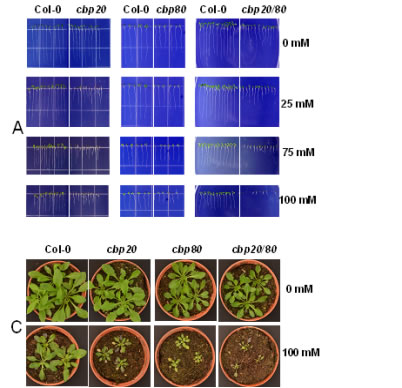The cap-binding proteins CBP20 and CBP80 have well-established roles in RNA metabolism and plant growth and development. Although these proteins are thought to be involved in the plant’s response to environmental stress, their functions in this process are unclear. Here, we demonstrated that Arabidopsis cbp20 and cbp80 null mutants had abnormal leaves and flowers and exhibited increased sensitivity to salt stress. The aberrant phenotypes were more pronounced in the cbp20/80 double mutant. Quantification by iTRAQ (isobaric tags for relative and absolute quantification) identified 77 differentially expressed proteins in the cbp20 and cbp80 lines compared to the wild type Col-0 under salt stress conditions. Most of these differentially expressed proteins were synergistically expressed in cbp20 and cbp80, suggesting that CBP20 and CBP80 have synergistic roles during the salt stress response. Biochemical analysis demonstrated that CBP20 and CBP80 physically interacted with each other. Further analysis revealed that CBP20/80 regulated the splicing of genes involved in proline and sugar metabolism, and that the epigenetic and post-translational modifications of these genes were involved in salt stress tolerance. Our data suggest a link between CBP20/80-dependent protein ubiquitination/sumoylation and the salt stress response.
This work has already published by Physiologia Plantarum (paper link: http://pubs.acs.org/doi/abs/10.1021/pr4012624), and was supported by the Young Academic and Technical Leader Raising Foundation of Yunnan Province (No.2012HB041), the National Natural Sciences Foundation of China (No. 31170256 ).

Figure Description: Sensitivity of cbp20, cbp80, and cbp20/80 to salt stress. (A) and (B) the phenotype of wild-type, cbp20, cbp80, and cbp20/80 seedlings grown on MS medium containing the indicated concentrations of NaCl. Photographs were taken and the root lengths were recorded after two weeks of growth. (Image by KIB)




